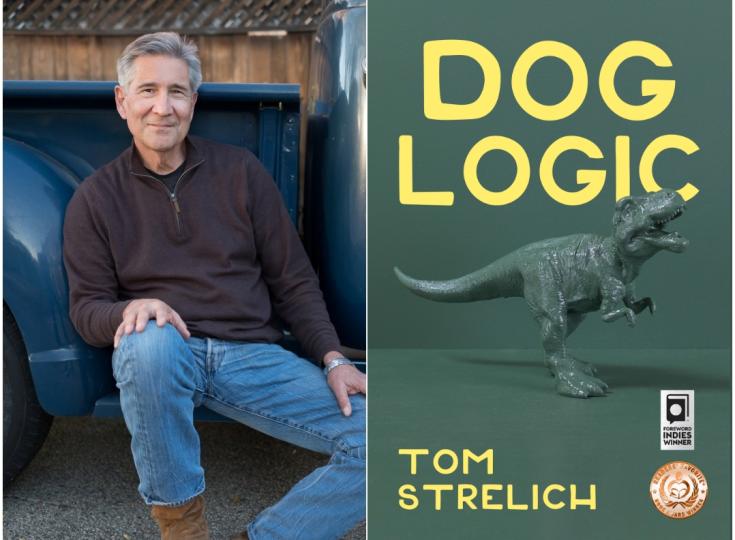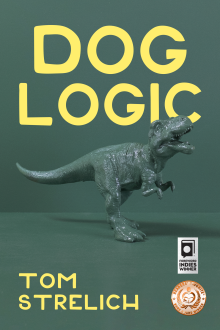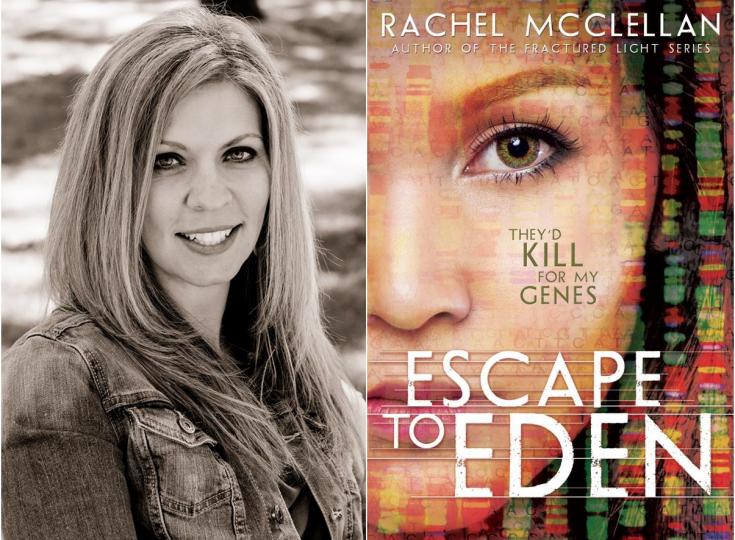Tom Strelich - Funny, Clever, Savvy and Wildly Unique

Strelich was born into a family of professional wrestlers and raised in Bakersfield, California, and his writing career began on a dare from a theatre director. His plays include BAFO (Best and Final Offer) which was commissioned by and had its world premiere at South Coast Repertory and its New York premiere at the American Place Theatre (APT); Dog Logic, which also had its world premiere at South Coast Repertory and went on to win a Kennedy Center Fund For New American Plays award for its New York premiere at the APT; and Neon Psalms, which won the Dramatists Guild/CBS New Play Award for its world premiere at the Magic Theatre in San Francisco and its New York premiere at the APT. Honors include a National Endowment for the Arts grant for playwrights and commissions from South Coast Repertory and the Actors Theatre of Louisville. Strelich has one screen credit, Out There (Showtime) and his novel, Dog Logic (loosely based on the play -- same setting, same characters, epically different story) was published in October 2017 and has since won several awards. As our Author of the Day, he tells us all about this book.
Please give us a short introduction to what Dog Logic is about.
Hertell Daggett discovers a lost civilization living under his failing pet cemetery. Well, maybe not lost so much as just, misinformed -- they've been living beneath the pet cemetery due to bad information they got in 1963 about the end of the world and were unaware that the world had wobbled on without them. Hertell finds a whole new life and whole new purpose as he lovingly leads his cherished duck-and-cover civilization into the glorious, mystifying, and often dismaying modern world. What could possibly go wrong?
What inspired you to write this story? Was there anything in particular that made you want to tackle this?
I wrote Dog Logic originally as a play that ran in New York, won some awards, got published, and it continues to be performed every year or so somewhere in the US. And the protagonist, Hertell Daggett, was such an interesting character to me that I wanted to take him on a new adventure, a completely different story this time, a bigger one — same characters, same setting, completely new story, an epic story this time.
Tell us more about Hertell Daggett. What makes him tick?
He was a physicist of some prominence but had been accidentally shot in the head at a celebratory New Year’s Eve party (or possibly the 4th of July, he could never remember — he’d been shot in the head after all). In any case, the doctors got the bullet out but left some little slivers of copper from the bull inside his brain where they floated around connecting things that aren’t connected in the rest of us, filaments of species memory going back to the beginning of time. He remembers the songs of dinosaurs, the dry humor of mastodons, and the rubbery smell of trilobites. It gives him a unique perspective of the modern world.
Readers say Dog Logic is both satirical and lyrical. Why did you create it this way?
I think because I started out as an actor and then transitioned into being a playwright (since I wasn’t a very good actor), I had a natural feel for the rhythms of speech and the spoken word and how to make dialog sound normal, to sound like something a person would really say, and yet still sound somewhat poetical, lyrical, memorable. So I carried those insights and instincts with me into the world of novels and narrative prose. The satirical element comes from the fact that there’s so much to both mock and marvel at in the modern world.
Besides writing, what other secret skills do you have?
I’m actually a pretty decent Bagpiper — it’s the only instrument that comes complete with a costume and an attitude. In fact, Dog Logic starts with a bagpipe funeral for a police dog, and the bagpiper ends up being a pivotal character in the book.
Why a time capsule? What drew you to this theme?
I think everybody has experienced discovering a time capsule: sometimes it’s just an old high school yearbook where you marvel at the hairstyles, sometimes it’s a cardboard box when your cleaning your garage or attic or moving and you end up immersed in your 8th-grade art projects. I wanted to do that in a big way, to pluck people (instead of artifacts) from 50 years ago and plunk them down in the present day — what would they make of us, what would we make of them. A pretty rich vein to mine as a writer.
Interesting cover. Please tell us more about how it came about.
The original cover was kind of… well, crappy, and a lot of people who loved the book told me they almost passed on getting it because of the cover. So I found a great graphic artist and had her read the flap copy and some of the reviews on Amazon and GoodReads (only the good reviews though) and she cooked up this fantastic new cover. It was genius and nothing I ever would have imagined. As you’d expect, I asked her to design the cover for the Dog Logic sequel (Water Memory), only this time I gave her the whole book to read and not just the flap copy and some reviews. That changed everything, and she cooked up covers for all three books in the Dog Logic Triptych (I’ve always been a Hieronymus Bosch fan)
Can Dog Logic be read as a standalone? How does it tie in with the sequel?
Yes, it can definitely be a standalone novel, and the sequel picks up 10 years after the end of Dog Logic. It’s even more epic than Dog Logic and takes Hertell and his duck-and-cover civilization to a whole new level in the near future. But since I couldn’t count on a reader having already read Dog Logic, I wrote Water Memory as a standalone novel as well, with just enough (but not too much) Dog Logic context to 1) make it work as a standalone novel, and 2) make a reader wanna go out and buy a copy of Dog Logic to see what happened before.
You were born into a family of professional wrestlers. How did this influence your writing?
As you’ve probably noticed, professional wrestling is very theatrical and has a classical 3 act play structure that typically concludes (satisfyingly) with the protagonist, while at a complete disadvantage and nearly given up for loss, finding a sudden source of strength (e.g., Popeye and his can of spinach) and then against all odds (and cheating villainous wrestlers with folding chairs), vanquishes the antagonist (or two if it’s a tag team). And I’d like to point out that the professional wrestlers lurking in my family tree were performing their art before folding chairs and steroids.
What did you have the most fun with when writing Dog Logic?
Probably the last third of the book since I had no idea where it was going to go, and I kept surprising myself with the directions it took. It’s actually a technique I’ve used since I was a playwright in which I’d intentionally write myself into a corner, such that the reader (or audience member) wonders, “how does he get out of this?” This would force me to come up with something, a twist, an unexpected turn, to send the story in some unpredictable direction.
Do any of your characters ever take off on their own tangent, refusing to do what you had planned for them?
Yes, and a great example is the Kaye character in Dog Logic. She was the female lead in the play version of Dog Logic, and I always felt I was missing an opportunity with her. But in the novel, she took on a whole new dimension and I learned all kinds of stuff about her and I totally fell in love with her.
Readers say this is a strange story. Was this your intention?
Yes, it definitely was because “strange" is just another way of saying “unpredictable", “unique", “compelling”, and “captivating”, and that’s usually what readers are seeking and what I’m seeking as a writer.
Dog Logic was a great success - did you suffer from "second novel anxiety" when working on Water Memory?
Yes, and I always do. When I was a playwright I definitely had “second play anxiety” and then “third play anxiety” etc., so I was not only quite familiar with the phenomenon (e.g., “Did I spend all my ammo?, "Did I lose my voice?", "Do I suck all of a sudden?" etc.), but also quite comfortable ignoring all those internal critics and just enjoying the creative process.
Do you have any interesting writing habits? What is an average writing day like for you?
Just the writing myself into a cornering technique I mentioned earlier. And there is no average writing day for me since any day that life gives me time to write is definitely an extraordinary (and the complete opposite of average) day!
What are you working on right now?
The Dog Logic sequel, Water Memory, just opened, so now I’m starting to work on the next book in the Triptych (ok, it’s a trilogy but Triptych sounds much cooler). The only problem is that I can’t decide whether to write the prequel to Dog Logic of the sequel to Water Memory. I’ve asked all of the advance readers and it’s an even split — half want to know what happened before Dog Logic where the story begins, and the other half want to know what happens next. Good problem to have, so I guess I’ll just have to write both — though I’m still not sure which to write first.
Where can our readers discover more of your work or interact with you?
Both Dog Logic and Water Memory are available on all the usual suspects (Amazon, Apple, B&N, Kobo, GooglePlay, Chirp, Audible, etc). The eBooks for both Dog Logic and Water Memory are exclusive to Amazon for the next few months for various promotions (like Manybooks), but the paperback, audiobook, and hardback (coming out next month for Water Memory) editions are available on all the rest. I’ve got a movie, “Out There” which I wrote and ran on Showtime back in the day and it’s now on Amazon Prime. All my plays are published by Samuel French/Concord Theatricals, and my website www.tomstrelich.com has a “contact” page if anyone wants to get in touch and also links to all the plays and videos and such.

Hertell Daggett has just discovered a time capsule. Only this one is full of people, and they've been living beneath his pet cemetery since 1963 due to some bad information they got about the end of the world. Hertell leads the duck-and-cover civilization into the glorious, mystifying, and often dismaying modern world. What could possibly go wrong?








